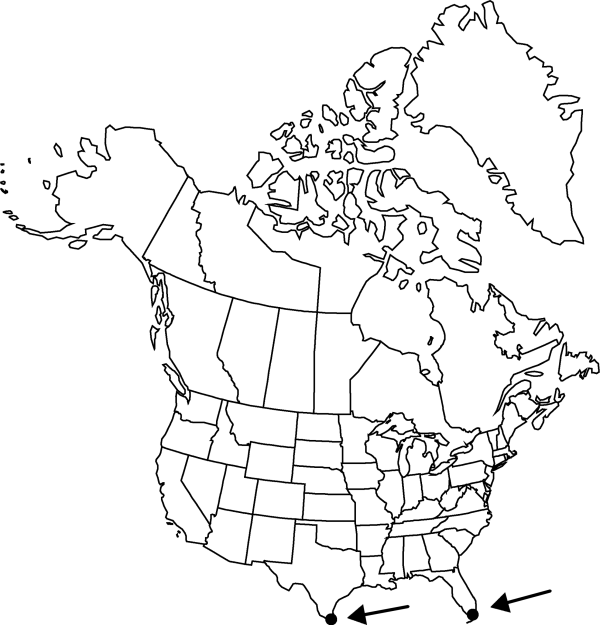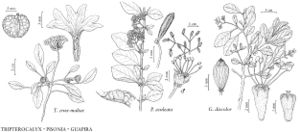Difference between revisions of "Pisonia aculeata"
Sp. Pl. 2: 1026. 1753.
FNA>Volume Importer |
FNA>Volume Importer |
||
| Line 17: | Line 17: | ||
}}<!-- | }}<!-- | ||
| − | --><span class="statement" id="st- | + | --><span class="statement" id="st-undefined" data-properties=""><b>Vines </b>or shrubs, to 3 m; vines subscandent, woody; branches spreading at right angles, armed with stout, recurved spines 6–20 mm. <b>Stems</b> velvety when young, glabrate later. <b>Leaf</b> blades ovate to obovate, 2–10 × 2–7 cm, base cuneate, apex subacute, glabrate. <b>Inflorescences</b>: staminate inflorescences subglobose, dense, 1–3 cm diam.; pistillate inflorescences subglobose at anthesis, more open in age; branches divaricate or ascending; fruiting pedicel 0.5–2 cm. <b>Perianths</b>: perianth of staminate flowers yellowish green, broadly campanulate, 2–3 mm, densely and shortly viscid-villous; perianth of pistillate flowers greenish, often blushed with red, 2–3 mm, puberulent. <b>Fruits</b> clavate, 7–10 × 3–4 mm, densely puberulent between glandular ribs, glands extending entire length of fruits.</span><!-- |
-->{{Treatment/Body | -->{{Treatment/Body | ||
| + | |phenology=Flowering throughout spring. | ||
|habitat=Hammocks, moist thickets | |habitat=Hammocks, moist thickets | ||
|elevation=0-100[-1000] m | |elevation=0-100[-1000] m | ||
| Line 39: | Line 40: | ||
|basionyms= | |basionyms= | ||
|family=Nyctaginaceae | |family=Nyctaginaceae | ||
| + | |phenology=Flowering throughout spring. | ||
|habitat=Hammocks, moist thickets | |habitat=Hammocks, moist thickets | ||
|elevation=0-100[-1000] m | |elevation=0-100[-1000] m | ||
| Line 46: | Line 48: | ||
|publication year=1753 | |publication year=1753 | ||
|special status= | |special status= | ||
| − | |source xml=https://jpend@bitbucket.org/aafc-mbb/fna- | + | |source xml=https://jpend@bitbucket.org/aafc-mbb/fna-data-curation.git/src/9216fc802291cd3df363fd52122300479582ede7/coarse_grained_fna_xml/V4/V4_151.xml |
|genus=Pisonia | |genus=Pisonia | ||
|species=Pisonia aculeata | |species=Pisonia aculeata | ||
| − | |||
| − | |||
| − | |||
| − | |||
| − | |||
| − | |||
| − | |||
| − | |||
| − | |||
| − | |||
| − | |||
| − | |||
| − | |||
| − | |||
| − | |||
| − | |||
| − | |||
| − | |||
| − | |||
| − | |||
| − | |||
| − | |||
| − | |||
| − | |||
| − | |||
| − | |||
| − | |||
| − | |||
| − | |||
| − | |||
| − | |||
| − | |||
}}<!-- | }}<!-- | ||
-->[[Category:Treatment]][[Category:Pisonia]] | -->[[Category:Treatment]][[Category:Pisonia]] | ||
Revision as of 13:57, 27 July 2019
Vines or shrubs, to 3 m; vines subscandent, woody; branches spreading at right angles, armed with stout, recurved spines 6–20 mm. Stems velvety when young, glabrate later. Leaf blades ovate to obovate, 2–10 × 2–7 cm, base cuneate, apex subacute, glabrate. Inflorescences: staminate inflorescences subglobose, dense, 1–3 cm diam.; pistillate inflorescences subglobose at anthesis, more open in age; branches divaricate or ascending; fruiting pedicel 0.5–2 cm. Perianths: perianth of staminate flowers yellowish green, broadly campanulate, 2–3 mm, densely and shortly viscid-villous; perianth of pistillate flowers greenish, often blushed with red, 2–3 mm, puberulent. Fruits clavate, 7–10 × 3–4 mm, densely puberulent between glandular ribs, glands extending entire length of fruits.
Phenology: Flowering throughout spring.
Habitat: Hammocks, moist thickets
Elevation: 0-100[-1000] m
Distribution

Fla., Tex., Mexico, West Indies, Central America, South America, Asia, Africa, Pacific Islands, Australia.
Discussion
Pisonia aculeata is nearly pantropical, found throughout the New World tropics and is considered introduced in Africa, Asia, and the Phillipines, but in the flora area it reaches only to the lower Rio Grande valley and southern Florida. It is closely allied with the less widely distributed Pisonia capitata, and there appears to be no distinction between pistillate plants of the two species. A. L. Bogle (1974) discussed the possible presence of Pisonia aculeata var. macranthocarpa in the flora.
Selected References
None.
